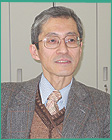Q: Memory consolidation is one of the most important roles of the brain. You, Dr. Nagao, like to divide the formation of memory into that which enables facts to be remembered and that which enables behaviours or skills to be remembered. Why?
A: This is true. Memory consolidation for facts, like spatial location, occurs via long-term potentiation, a phenomenon that generates long-lasting synaptic responses in hippocampal synapses in response to learning. However, it is the reverse mechanism, long-term depression (LTD) that obstructs neuronal signaling in cerebellar synapses and facilitates behaviour or motor skill learning. You may think it strange that opposite mechanisms regulate different forms of the same action, memory consolidation, but logical operations typically involve operands that add information and those that inhibit information. Inhibition is fundamental to information processing, and LTD is one key that enables the process.
Q: How did chose to research this form of memory?
A: Following graduation from medical school, I worked in clinical medicine for two years. But thinking that research would be more interesting, I returned to graduate school. I entered Dr. Masao Ito's laboratory at the University of Tokyo. Dr. Ito was the first person to identify LTD, so naturally I began to research issues related to this discovery.
Actually, I was Dr. Ito's last assistant at the University of Tokyo, and I was able to continue our research into motor learning memory, that mechanism that enables the brain to learn behaviour and skills, after he left. How memories form and are recalled are among the most important topics in brain research worldwide. A large number of papers have been published and symposiums internationally due to the vast number of researchers trying to understand motor learning. The endless struggle taking place in this very competitive setting is one I enjoy and have enjoyed for more than 20 years.
Q: Motor learning can also be categorized, right?
A: Oh yes. While at the university, I studied short-term motor learning, which can usually be induced following a few hours of training. Long-term motor learning, however, requires days of training. While I knew of long-term motor learning while I was at graduate school, systematic study of the process was not then possible. Fortunately, JST (the Japan Science and Technology Agency) awarded a large grant seven years ago to BSI that enable an increase in research budgets and staffing at BSI. Unexpectedly, this development opened up the change for me to return to a study of long-term memory formation.
Q: Your children were also a source of your learning?
A: Yes, since my wife and I both worked, it was my responsibility to escort my sons to nursery school. Since my eldest son is six years older than the younger, I spent twelve consecutive years going to and from the nursery school. Therefore, I was able to watch my children grow every day. I could observe the wonders and mysteries of the brain so familiar to me in my research, in the development of my children. Following birth, a child first learns to hold his or her neck before standing and then walking. Those first steps are tentative and brief, but soon they can walk, all thanks to LTD. I must have learned a lot from my children, as I watched with pleasure of a father as they developed. I later came feel that I was actually regarding through the eyes of a researcher, not a father, as I have been a researcher for so long those insignificant daily events can so impress me.
Q: What thoughts do you try to keep in mind when managing your laboratory?
A: We emphasize education and strive to cultivate researchers for the next generation. At present, we have eight people in the lab and I expect to have two more from April. Our researchers are relatively young, and three technicians will enter graduate school for employed students so that may obtain degrees while working in our laboratory. My generation of researchers will retire in about ten years, so helping younger generations to carry on our work will be important for future studies of brain physiology.
The right mental attitude towards research, that knows that the pursuit of truth is the duty of a scientist, is important for research success. Obtaining accurate data without concern for the time or effort required is what drives good research. Research is conducted in a demanding intellectual environment with severe competition, but enough time for reviewing, confirming, and making doubly or triply sure about information is also important. I value quality over rapidity in research so that the results will withstand scrutiny and criticism in the future. I hope that younger generations embark on a career in research with an exacting mental attitude toward science that will lead to future success.






